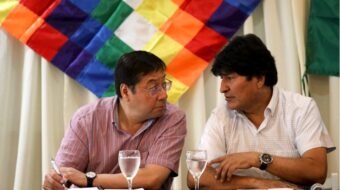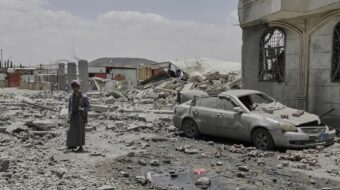Peru: Workers, peasants mount general strike
The General Confederation of Peruvian Workers protested Peru’s free trade treaty with the U.S. as well as low wages and rising costs by staging a nationwide general strike on July 10. Two peasant groups orchestrated the participation of small farmers, many irate over legislation subjecting land tenure to mine owner needs.
The strike’s main impact was in rural areas, especially in the poverty-stricken south. The report on rebelion.org cites the coexistence in Peru of widened income disparities and annual economic growth rates of 8-9 percent. In Ayacucho, protesters invoking national sovereignty demanded that 200 U.S. troops in the area, supposedly on humanitarian missions, leave.
President Alan Garcia initially commended marchers and those blocking highways for protesting peacefully. Later he announced, “What we are seeing is a conspiracy,” adding, “They want to attack the democratic system.”
Somalia: U.S. complicit in humanitarian disaster
Osman Ali Ahmed, UN development head in Somalia, was killed in Mogadishu July 6. Within two days, 40 more civilians were killed. The 18-month-long war between Ethiopia’s army and guerrillas allied to the Islamic Courts Union — the short-lived former government — has triggered Africa’s worst humanitarian disaster, Mike Whitney reports on Indymedia.org.uk.
Famine looms for 2.6 million Somalis. Over one million are displaced. Mogadishu is largely rubble. Under Bush administration pressure, the UN Security Council authorized the Ethiopian intervention in late 2006 as a counter terrorism measure. Deep water ports and sites for military bases reportedly serve as enticements for Washington.
Amnesty International issued a report in May citing violations of human rights and international law.
Saudi Arabia: Domestic workers abused, exploited
Human Rights Watch issued a report July 9, based on in-country research and interviews, testifying to grief suffered by domestic employees in Saudi households. They total 1.5 million and originate from the Philippines, Sri Lanka, Nepal and Indonesia. Many work 18 hours per day, receive little or no pay, have no day off, and are subjected to forced confinement, sexual and physical abuse.
According to the UK Guardian, Saudi labor law does not cover domestic workers except to grant employers control over their visas, thereby preventing many from changing jobs or leaving the country. Commissions for those recruiting domestic workers for Saudi Arabia far exceed those earned by recruiters for other countries.
Britain, Ireland: Unions protest Israeli crimes
Britain’s largest public sector union UNISON, meeting in late June, reaffirmed previous resolutions calling for boycotts of Israeli imports produced in occupied Palestinian territories and divestment from companies building the Israeli wall ringing Palestinian settlements, Labornet.org reported.
The resolutions parallel those passed earlier this year by IMPACT, Ireland’s largest public sector union, and NIPSA, its counterpart in Northern Ireland. They too called for boycott and divestment with IMPACT demanding Irish independence from EU positions denying Palestinian rights.
The Irish Congress of Trade Unions, having passed similar resolutions last year, issued a statement backing IMPACT: “Israeli terror and violence … is right in front of our eyes.” We risk “being brutalized ourselves.”
Japan: Guests pressure G8 host
At the recent G8 summit, hosted by Japan, Prime Minister Yasuo Fukuda met with seven African presidents present as observers. He learned that of $25 billion the G8 pledged for Africa in 2005, only $3 billion had materialized.
A Japanese foreign ministry spokesman reassured the African leaders that the funding would arrive, citing expansion of Japan’s own aid package to $1.8 billion annually.
UN Secretary-General Ban Ki-moon responded by calling for doubled G8 aid by 2010, according to Inter Press Service.
At the summit, Japan faced pressures from President George Bush to deepen its military alliance with the U.S., a move the Japan Press Service warns is likely to weaken Japan’s commitment to dealing with climate change, a principal summit theme.
Panama: A measure of justice but more is needed
Panama’s Supreme Court ruled unanimously June 30 that outgoing President Mireya Moscoso’s pardon of Luis Posada and three others jailed in connection with an assassination attempt against Fidel Castro in 2000 was unconstitutional. Posada then entered the United States illegally and lives freely in Miami.
Few deny that Posada, while living in Venezuela, engineered the bombing of a Cuban airliner in 1976 killing 73 people. Venezuela, through its U.S. lawyer Jose Pertierra, has requested his extradition. Now Pertierra demands Posada’s return to jail in Panama.
Panama’s National Assembly convoked a meeting July 7 of Latin American and Caribbean parliamentarians to demand freedom for five Cuban men who in September will have served 10 years in U.S. jails. Ramón Labañino, Fernando González, Antonio Guerrero, Gerardo Hernández and René González tried to block terrorist attacks perpetrated in Florida by the likes of Luis Posada. That was their crime.
World Notes are compiled by W.T. Whitney Jr. (atwhit @roadrunner.com)









